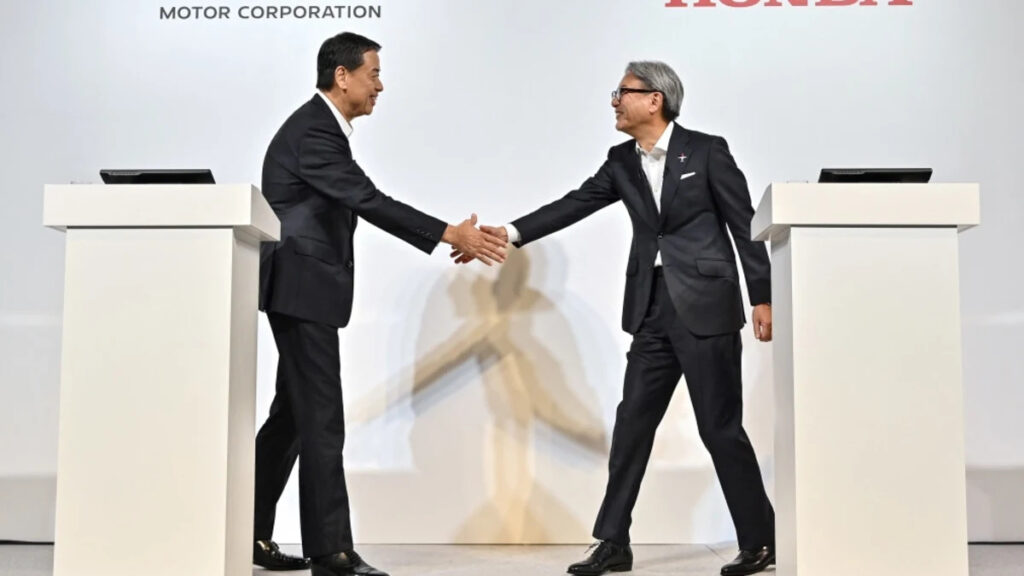Honda-Nissan-Mitsubishi alliance completes Japan car industry consolidation

Makoto Uchida (left), president and CEO of Nissan, and Toshihiro Mibe, director, president and representative executive officer of Honda, at a press conference in Tokyo on Thursday. (Getty)
Japan’s carmakers are putting the finishing touches on a combine-and-compete strategy for an automotive age defined by batteries and software, with three manufacturers joining forces to complement a separate Toyota Motor Corp.-led coalition.
Honda Motor Co. and Nissan Motor Co. agreed this week to build upon a preliminary deal first reached in March, offering more details of how they plan to work together and also adding Mitsubishi Motors Corp. to the mix. While the companies haven’t yet discussed a capital alliance, forming one is a possibility, Honda Chief Executive Officer Toshihiro Mibe said.
The partnership will span joint work on software development, batteries and other electric-vehicle components, as well as EV charging and energy services, the three companies said. Their cozying up to one another follows Toyota acquiring stakes in Subaru Corp., Suzuki Motor Corp. and Mazda Motor Corp., and helping them navigate a fraught era for legacy car companies.
Whereas Toyota has tied up with its domestic peers from a position of strength — it’s been the world’s best-selling automaker for four years running — Honda, Nissan and Mitsubishi each are much smaller players on the global stage. Their coming together is seen as a move by Japan’s government to fortify its auto industry in the wake of China having emerged as the world’s new No. 1 car exporter.
“This is coordinated by the government to build a competitive automaking industry,” said James Hong, analyst at Macquarie Securities Korea Ltd., adding that most automakers in Japan are too small to be able to invest in EVs individually. “It feels like a politically driven alliance.”
While the US has had the Big Three — General Motors Co., Ford Motor Co. and Chrysler, now owned by Stellantis NV — and Germany similarly has a trio in Volkswagen Group, BMW AG and Mercedes-Benz, Japan has a much bigger crop of carmakers manufacturing vehicles across the globe.
Honda, Nissan and Mitsubishi combined sold about 4 million vehicles globally in the first six months of the year, well shy of the 5.2 million that Toyota sold on its own. While the three touted the potential for generating synergies from working together, executives also acknowledged they’ll have to overcome contrasts with their compatriots.
“Although we have different cultures, we share the same challenges,” Nissan Chief Executive Officer Makoto Uchida said at a news conference with Mibe.
Nissan, Honda and Mitsubishi have been behind the curve in moving to what automakers increasingly refer to as software-defined vehicles, which run on code as much or more than cars of the past were powered by combustion engines. The Japanese government set a target last month for its companies to account for 30% of the software-defined vehicle market in 2030.
In addition to working together in software fields including automated driving, connectivity and artificial intelligence, the automakers may share battery specifications and supply. Honda and Nissan also are looking at re-badging one other’s cars, which both combustion-engine and battery-powered vehicles under consideration. The two didn’t offer specifics on particular models or outline how they may complement one another by region.
Honda has announced plans to invest ¥10 trillion on electrification this decade, while Nissan brings to the table the knowhow of having introduced the first fully electric car of the modern age — the Leaf — in 2010. Mitsubishi Motors excels in plug-in hybrid electric vehicles and has a strong position in Southeast Asia.
China is also a key factor behind the Honda-Nissan-Mitsubishi Motors partnership. All of Japan’s automakers have been losing share in the world’s largest auto market, largely due to the rising popularity of EVs.
In June, Honda and Nissan sales fell about 40% and 27%, respectively, in China following the shutdown of some of their local plants. Last week, Honda decided to cut production of gasoline cars there by 19%. Mitsubishi Motors exited last year.
“Honda and Nissan have been struggling in China, and they will have to make more EVs to be able to stay there,” said Tatsuo Yoshida, senior auto analyst at Bloomberg Intelligence. The alliance therefore “makes sense.”
For Nissan, the deal with Honda signals further deemphasis of the company’s alliance with Renault SA. While the French manufacturer saved Nissan more than two decades ago with a cash injection and by bringing in former Chairman Carlos Ghosn, they’re now in the process of equalizing their cross-shareholdings and unwinding aspects of their decades-long cooperation.
Mitsubishi joined the alliance in 2016, when Nissan made an investment in the smaller carmaker. Nissan currently owns about a third of the company.
The Honda-Nissan partnership will be on a more equal footing than what Nissan experienced with Renault, according to Seiji Sugiura, analyst at Tokai Tokyo Intelligence Laboratory Co.
“Nissan couldn’t resist whatever Renault said,” Sugiura said, adding that they will now be able to leverage each other’s strengths. “They weren’t really equal partners,” he said.
Honda had been working with General Motors Co. on electric powertrains and software, but called off its plans last year to develop small EVs. Nissan’s relationship with Renault, which was always tense, deteriorated further after Ghosn was arrested in 2018 on charges of overstating his compensation, which he’s denied.







